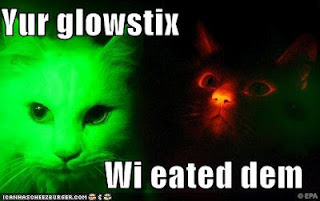Summertime can be nerve-wracking for cats because so many holidays are celebrated with fireworks. Many cats will run for the bed when there’s a mere knock on the door or a ring of the doorbell. When firecrackers go off, it can be devastating to a timid kitty. To help your cat cope, you can prepare a sanctuary in advance – a bed in a closet or the basement where the sounds will be more muffled. Feliway spray or a diffuser and items with your kitty’s own smell on them will help create a calming scent. Show your cat this area before the 4th of July so she will know it’s her safe place. It might also help to spend the evening in the room with your cats, petting them and offering soothing words.
 If you have tried offering a secluded room in the past and your cat is still
traumatized, you might want to ask your
veterinarian about a mild sedative or tranquilizer, just to get the cat through
the day. Try to check on your cat every
couple of hours, petting her and talking to her. Try to keep to her normal
feeding schedule as much as possible, since cats are stressed by changes in
routine.
If you have tried offering a secluded room in the past and your cat is still
traumatized, you might want to ask your
veterinarian about a mild sedative or tranquilizer, just to get the cat through
the day. Try to check on your cat every
couple of hours, petting her and talking to her. Try to keep to her normal
feeding schedule as much as possible, since cats are stressed by changes in
routine.If your cat normally spends time outdoors, it would be best to keep him indoors for the day. Unfortunately, there are people who find it amusing to tie strings of firecrackers to cats’ tails. Curious cats may receive burned paws or faces from lit fireworks or sparklers, or may receive burns from falling sparks. Playing with unlit fireworks may result in ingestion of heavy metals – not rock band music, but toxic substances such as potassium nitrate and arsenic. At night, your cat may also be at risk for being hit by falling burning debris or misfired rockets.
If you are planning a boisterous barbecue with lots of guests, you might want to consider boarding your cat during the holiday. Otherwise, it is a good idea to keep your cats in their sanctuary with food, water and litter for the duration of the party. Cats that are frightened because of large numbers of people might dash for the door, or curious cats may slip outside along with an unwary visitor or through a door that was accidentally left open. This is an excellent reason why even indoor cats benefit from being microchipped!
Even if it's just family, try to discourage people from feeding your kitty scraps from the barbecue, though she might beg. Feeding something other than a normal diet at a time of high stress can cause diarrhea or result in vomiting later. Also, many barbecued foods are seasoned with garlic and onions, which are toxic to cats, or other seasonings that may cause stomach upset. It is never a good idea to offer beer or other alcoholic drinks to pets, or leave it where pets can reach it. It takes a much smaller amount of alcohol to poison a pet than it does a human. Signs of alcohol poisoning are weakness, depression, coma and death.
Only use sunscreen and insect repellents that are designed for cats. DEET (N,N-Diethyl-meta-toluamide) is not a product recommended for use in pets and can cause neurological problems. Do not use dog products on cats. Pyrethrins have a very narrow range of safety, so using the wrong size product can poison your pet. Any product containing permethrin is toxic to cats! In fact, it is much safer to use products that do not contain permethrins or pyrethrins, such as Revolution and Advantage Multi (heartworm and flea preventive products all in one), or Advantage (flea prevention only) and Frontline (flea and tick protection). Ingestion of sunscreen products can cause drooling, vomiting, diarrhea, excessive thirst and lethargy.
Make sure to protect your cats from heartworm disease with monthly preventives, even if they live indoors. Heartworm disease is transmitted through the bite of a mosquito, and mosquitoes occasionally come indoors. This year is projected to be an especially bad year for mosquitoes due to the mild winter weather.
 |
| Note: Eating a glow stick will not make your cat glow. Sorry! |
Do not allow pets to wear or play with glow jewelry. The glowing substance inside these products is not highly toxic, but can cause stomach irritation and excessive drooling. Small parts may be swallowed and require surgical removal.
Citronella candles or other products can cause stomach irritation if ingested.
 |
| Make sure that your pool is pet safe! |
Summer is a time of relaxation and carefree fun in the sun – make sure that you take precautions to keep it that way for your pet, too!




No comments:
Post a Comment